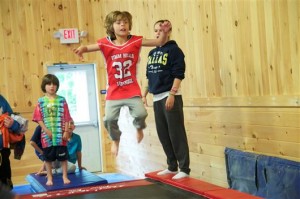 It’s camp season and, over the next couple of weeks, a lot of children will head off to summer camp for the first time. The first summer of camp is an exciting time for new campers. For many, it’s their first time away from home and their parents for an extended period of time. Chances are, they’ve visited their new camp already and seen all of the fun stuff there is to do there. They have probably even met a few new camp friends. Sometimes, as the beginning of camp nears, the butterflies set in a bit for both campers and parents. Campers worry about being away from home, and parents worry about campers being away from home. Here are a few tips for keeping the anticipation level high and the butterflies at bay for both campers and their parents so that everyone can be set up for a successful summer.
It’s camp season and, over the next couple of weeks, a lot of children will head off to summer camp for the first time. The first summer of camp is an exciting time for new campers. For many, it’s their first time away from home and their parents for an extended period of time. Chances are, they’ve visited their new camp already and seen all of the fun stuff there is to do there. They have probably even met a few new camp friends. Sometimes, as the beginning of camp nears, the butterflies set in a bit for both campers and parents. Campers worry about being away from home, and parents worry about campers being away from home. Here are a few tips for keeping the anticipation level high and the butterflies at bay for both campers and their parents so that everyone can be set up for a successful summer.
*Emphasize to your camper all the fun stuff he or she will get to do at camp that he or she doesn’t get the opportunity to do at home. Children love new things. They’re likely to be even more excited about camp if they think there are activities they can only do at camp (and there are). If you have visited the camp, remind them of the things they saw there that excited them most.
*Encourage them not to be afraid to try new things. Remind them that camp is a place where they have the opportunity to try lots of new  things and urge them to try as many as possible. Many a camper has tried an activity for the first time at camp and developed a passion that they continued to pursue during those months they’re not at camp as well as into high school or even college.
things and urge them to try as many as possible. Many a camper has tried an activity for the first time at camp and developed a passion that they continued to pursue during those months they’re not at camp as well as into high school or even college.
*Some children are shy about meeting new people, so rather than challenge campers to make new friends, reaffirm that they are not the only camper attending sleepaway camp for the first time and ask them to treat other new campers the way they want to be treated in the same situation. Friendships will naturally follow.
*Almost all new campers experience minor homesickness, and it’s not always within the first few days of camp. For some campers, the feeling comes somewhere in the middle while others make it through almost the entire summer before even remembering that they have a home outside of camp. Believe us when we tell you that, for the vast majority of them, the blues pass within a day or two. Don’t panic if you speak to your new camper one day and he/she sounds a little less enthusiastic than on previous calls or you get a letter written on a  day that wasn’t his or her best day at camp. Most camps have multiple staff members charged with monitoring the behavioral patterns and moods of campers—especially younger or new campers—and will alert parents if necessary. Rule of thumb: If you haven’t heard from the camp, chances are that everything was fine again within minutes of your child hanging up the phone or writing that letter.
day that wasn’t his or her best day at camp. Most camps have multiple staff members charged with monitoring the behavioral patterns and moods of campers—especially younger or new campers—and will alert parents if necessary. Rule of thumb: If you haven’t heard from the camp, chances are that everything was fine again within minutes of your child hanging up the phone or writing that letter.
*If you have a child who tends to be shy, reassure him/her that it’s okay to act silly at camp. In fact, that’s what camp is—a place where kids can have fun and act goofy.
*Have a transition plan for both the beginning and end of camp. Walk your child through each step of getting on the bus, train, or plane, and saying goodbye. Literally start with first, we’ll do this, then we’ll do this, etc. This lessens the anxiety of wondering when the moment is coming and gives him/her and you guidelines for mentally preparing to leave. At the end of the summer, have a plan for helping your camper transition back into home life. Summer camp is a very different world from home and getting back into the school year mode after a summer full of excitement can be challenging for some campers. Also, be prepared. So much has happened in such a short amount of time that your child might not stop talking for several days, even if he or she generally isn’t very talkative. Be excited. Your child is more likely to be excited about returning the following summer if he/she thinks you’re excited too.
At the end of the summer, have a plan for helping your camper transition back into home life. Summer camp is a very different world from home and getting back into the school year mode after a summer full of excitement can be challenging for some campers. Also, be prepared. So much has happened in such a short amount of time that your child might not stop talking for several days, even if he or she generally isn’t very talkative. Be excited. Your child is more likely to be excited about returning the following summer if he/she thinks you’re excited too.
With a little bit of preparation, your new camper will have a great first summer!

 570-798-9831
570-798-9831